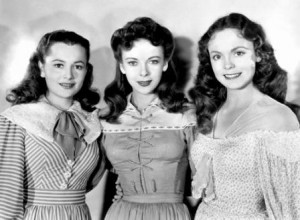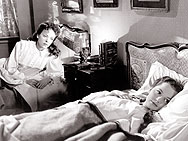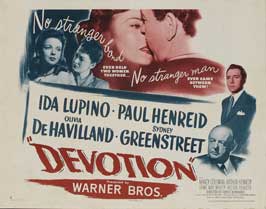Devotion (1946)
“The world has always frightened me a little, so I’m really not afraid to leave it now. Though sometimes, when I hear the wind blowing through the heather, or see the sun go down beyond Wuthering Heights, I think, perhaps, I’d like to stay just a little longer.”—Emily Brontë
What? Come again?! These lines from Warner Bros.’ 1946 Devotion should give some hint of the implausibility of this whole enterprise, from start to finish. While a relatively accurate history lesson might be gleaned from Plymouth Adventure, this film, made three years before its actual release, is the last possible source for reliable insights into the lives of the Brontë sisters—Emily (Ida Lupino), Charlotte (Olivia de Havilland) and Anne (Nancy Coleman). The screenwriters—Keith Winter and associates should be ashamed of themselves!—would have us believe that the Reverend Arthur Nicholls (a horribly miscast Paul Henreid) was the source of a love contest between Emily and Charlotte—and the inspiration for the protagonists in their novels, Heathcliff in Wuthering Heights and Mr. Rochester in Jane Eyre!
Devotion is another in the on-going series of WB Archive releases. The movie, from the time of its initial theatrical release, has always been criticized as a mixed bag of undisciplined components.
 An admirable cast struggles to bring life and authenticity to the story. Olivia de Havilland, playing against type as the sharp-tongued Charlotte, emerges surprisingly unscathed, given her implausible infatuation for Nicholls and the abysmal lines she is often required to utter. Arthur Kennedy, a competent actor who never quite made the big time, gives one of the film’s best performances as the sisters’ drunken brother Branwell. His real-life opium addiction, of course, is not mentioned. Miscast along with Paul Henreid is Sydney Greenstreet as a jovial, one-dimensional William Makepeace Thackeray, Charles Dicken’s contemporary and lesser rival.
An admirable cast struggles to bring life and authenticity to the story. Olivia de Havilland, playing against type as the sharp-tongued Charlotte, emerges surprisingly unscathed, given her implausible infatuation for Nicholls and the abysmal lines she is often required to utter. Arthur Kennedy, a competent actor who never quite made the big time, gives one of the film’s best performances as the sisters’ drunken brother Branwell. His real-life opium addiction, of course, is not mentioned. Miscast along with Paul Henreid is Sydney Greenstreet as a jovial, one-dimensional William Makepeace Thackeray, Charles Dicken’s contemporary and lesser rival.
Montagu Love, in his last role, is the reverend-father of the four Brontë siblings, and emits that strong-willed persona of so many of his roles—Henry VIII in The Prince and the Pauper, José de Montares in Juarez, Don Alejandro Vega in The Mark of Zorro and King Phillip II in The Sea Hawk. The endearing Dame May Whitty appears as a congenial neighbor, and Victor Francen, Edmund Breon, Rita Lupino (Ida’s younger sister), Ethel Griffies, Forrester Harvey and Harry Cording do their best in bit parts.
All is not lost. As a general rule, no movie is all bad, although, given a few moments, I guess I could recall a few. On the plus side, here is the superb cinematography of one of the greats, Ernest Haller. The set direction by Casey Roberts and the art direction by Robert M. Haas create a credible atmosphere of the English moors, transforming Warner back lots and sets to a reasonable facsimile of the original West Yorkshire countryside of the Brontës.
And then, too, Erich Wolfgang Korngold’s score is easily the biggest plus of all, another example, along with Escape Me Never and the Eleanor Parker remake of Of Human Bondage, of the composer’s conscientious approach to even the most banal of films. The main title begins ominously, with a snatch of music for the dark horseman of Emily’s nightmare, quickly replaced by the passionate principal theme with those uplifting, ascending notes in its second half.
From the outset, Erich Wolfgang Korngold smoothly establishes the tone as he segues from one theme to another, reflecting the changing screen images and characters, almost five minutes of continuous music, in the manner of the openings of Anthony Adverse and Kings Row, which contain many times that much unbroken music. And the tone is eloquently maintained throughout all the music to come—the evocation of the moors, Charlotte’s romance with Nicholls, Branwell’s death, even what might be interpreted as an insignificant theme for Aunt Branwell (Griffies) and the agitated music for the bar scene with an intoxicated Branwell.
 But the most memorable music is that for Emily’s nightmare about the cloaked horseman. She first describes her dream to Nicholls while they stroll the moors and she shows him that edifice of her inspiration, Wuthering Heights. The dream music dies away, and she confides to Nicholls that the source of her fear was “only one of our moor horses.”
But the most memorable music is that for Emily’s nightmare about the cloaked horseman. She first describes her dream to Nicholls while they stroll the moors and she shows him that edifice of her inspiration, Wuthering Heights. The dream music dies away, and she confides to Nicholls that the source of her fear was “only one of our moor horses.”
As it turns out in the film’s climax, as most viewers have already suspected, as Emily herself must have known, the dark horseman is death, and it is her lines about being frightened by the world and yet reluctant to leave it that precede her dying. Erich Wolfgang Korngold treats the return of the horseman even more frightfully than before, with swirling strings and the tolling of low bells. Her earlier lovely theme is now given to a dark trumpet—a beckoning call—and a four-note repeated rhythm in the xylophone supposedly represents the horse’s hooves. The vibraphone, a favorite instrument since the composer’s earliest works, contributes an eerie and dominant part to the orchestral texture.
The final visual of Devotion, Charlotte and Nicholls walking off through the heather, is made sumptuous, and the cliché scene given some credence, by the music. Korngold now quotes, full throttle, that rapturous main theme, which the composer deemed worthy enough to include in a later set of German songs, based on Richard Dehmel’s “Congratulation.”
If there was ever a movie to “see” because of the score, this is it.
